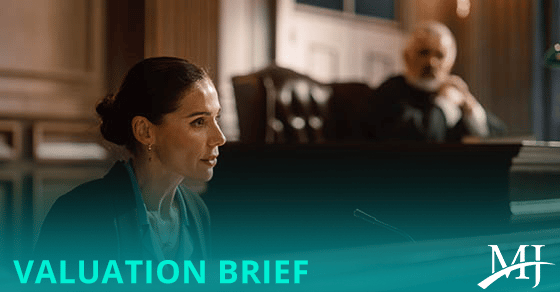The 30-year anniversary of Daubert v. Merrell Dow Pharmaceuticals Inc. (509 U.S. 579) will be coming up in 2023. This decision officially made federal judges the “gatekeepers” of expert evidence against “junk science.”
Landmark case
In 1993, Daubert established a two-pronged test for admissibility under Rule 702 of the Federal Rules of Evidence: An expert’s methodology must be 1) reliable, and 2) relevant. This case also identified four nonexclusive factors to consider in determining the reliability of an expert’s theory or technique:
- Has it been tested, and can it be tested?
- Has it been subject to peer review or publication?
- What’s its known or potential error rate?
- Is it generally accepted in the relevant scientific or technical community?
The discounted cash flow method is an example of a widely accepted valuation technique that meets all four criteria set forth by the Daubert standard. However, the Supreme Court intended for courts to consider these questions with flexibility and consider the method’s replicability. For instance, a new method might pass muster if another expert can replicate the expert’s analyses — and if the expert can persuade the court that it’s appropriate for the case.
Extension to business valuation
Daubert dealt specifically with medical expert witness testimony. In 1999, Kumho Tire Company v. Carmichael (526 U.S. 137) extended the scope of Daubert beyond scientific testimony to other financial experts, including accountants, economists and business valuation professionals.
When financial experts are disqualified under Daubert, it’s usually on grounds of reliability. For example, experts may be disqualified if they rely on insufficient data or use methods that aren’t generally accepted. But some financial experts have been excluded on relevance grounds. For example, an expert’s testimony may be excluded if it’s outside of his or her area of expertise or wasn’t tied to the specific facts of the case.
Dos and Don’ts
Here’s what can you do — or avoid doing — to help confront Daubert challenges:
- Match your expert’s academic credentials, certifications and experience with the relevant issues of your case. For example, be aware of the different skill sets of business valuation and forensic accounting experts.
- Allow experts to work independently. Experts who rely too heavily on work done by others or on data furnished by others (say, an attorney or the client) run the risk of exclusion.
- Never ask experts to testify outside of their areas of expertise. It’s particularly dangerous when financial experts venture into legal territory. For instance, while forensic experts can safely testify about hidden assets or other evidence of fraud, they should avoid making any legal conclusions about whether fraud occurred.
- Never be afraid to question your expert’s methods and assumptions for reliability. Evaluate whether the expert’s analyses meet the four nonexclusive factors to consider in determining reliability. Many experts use multiple methods to arrive at their conclusions. That way, if one method fails a Daubert challenge, a conclusion based on an alternative method may still be admitted into evidence.
If opposing counsel hits you with a Daubert challenge, start by reviewing case law involving similar experts. Doing so may alert you to other potential vulnerabilities in your expert’s qualifications and analyses.
An ounce of prevention
Following these best practices can help ensure that your expert’s opinion will be admissible in court. Contact us for more information. We have the expertise and qualifications to provide reliable, relevant testimony on business valuation matters.
© 2022




